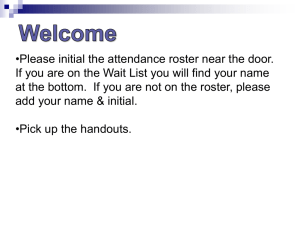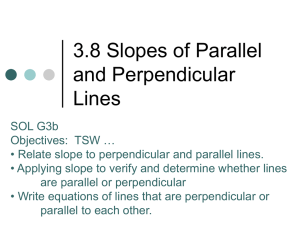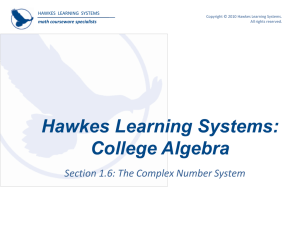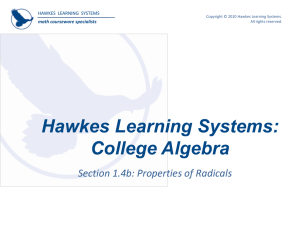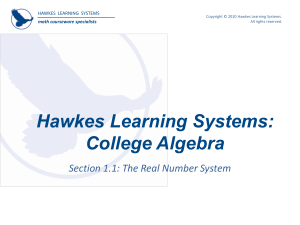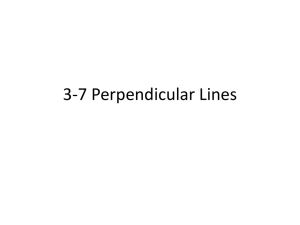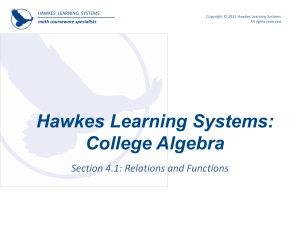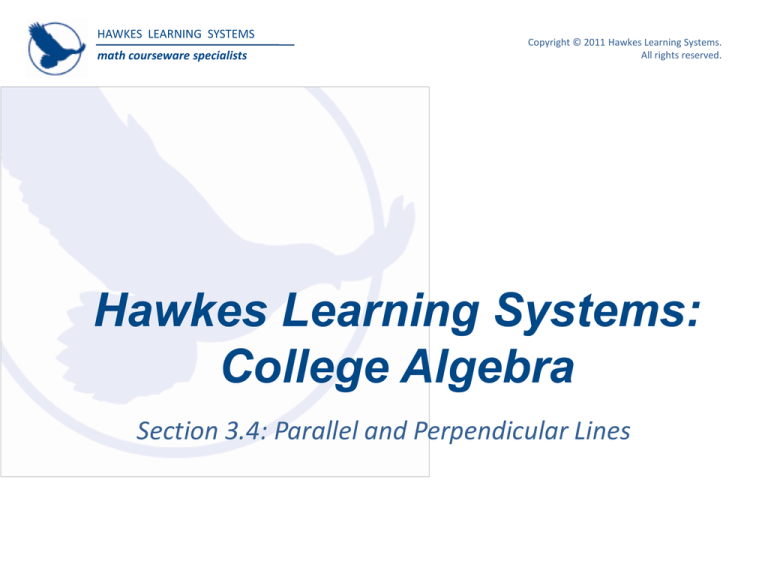
HAWKES LEARNING SYSTEMS
math courseware specialists
Copyright © 2011 Hawkes Learning Systems.
All rights reserved.
Hawkes Learning Systems:
College Algebra
Section 3.4: Parallel and Perpendicular Lines
HAWKES LEARNING SYSTEMS
Copyright © 2011 Hawkes Learning Systems.
All rights reserved.
math courseware specialists
Objectives
o Slopes of parallel lines.
o Slopes of perpendicular lines.
HAWKES LEARNING SYSTEMS
math courseware specialists
Copyright © 2011 Hawkes Learning Systems.
All rights reserved.
Slopes of Parallel Lines
o The slope of a line is a precise indication of its
“steepness”, and two lines are parallel if and only if
they have the same slope. In the case of vertical
lines, this means they both have undefined slope.
o This fact is clear from the formula for slope: two lines
are parallel if and only if they both “rise” vertically
the same amount relative to the same horizontal
“run”.
o We can use this observation to derive equations for
lines that are described in terms of other lines.
HAWKES LEARNING SYSTEMS
math courseware specialists
Copyright © 2011 Hawkes Learning Systems.
All rights reserved.
Example 1: Slopes of Parallel Lines
Find the equation, in slope-intercept form, for the line
which is parallel to the line 8 x 2 y 10 and which
passes through the point 1,5 .
8 x 2 y 10
Step 1: Write equation in
2 y 10 8 x
slope-intercept form.
y 4 x 5
Use slope m 4 to write a new equation that passes
through the point 1,5 .
Step 2: Use point-slope form.
y 5 4 x 1
Step 3: Solve for y to obtain
y 5 4 x 4
slope-intercept form.
y 4 x 1
HAWKES LEARNING SYSTEMS
math courseware specialists
Copyright © 2011 Hawkes Learning Systems.
All rights reserved.
Example 2: Slopes of Parallel Lines
Determine if the quadrilateral (four sided figure) whose vertices
are (-2,0),(3,-1),(4,1), and (-1,2) is a parallelogram (a quadrilateral
in which both pairs of opposite sides are parallel).
The slopes of the left and right sides are,
respectively,
1 1 2
02
2
2.
2 and
3 4 1
2 1 1
The slopes of the top and bottom sides
are, respectively,
0 1 1 1
2 1
1 1
.
and
1 4 5 5
2 3 5 5
1, 2
2,0
4,1
3, 1
The figure is a
parallelogram.
HAWKES LEARNING SYSTEMS
math courseware specialists
Copyright © 2011 Hawkes Learning Systems.
All rights reserved.
The Slopes of Parallel Lines
Two non-vertical lines with slopes m1
and m2 are parallel if and only if m1 m2
Also, two vertical lines (with undefined
slopes) are always parallel to each
other.
HAWKES LEARNING SYSTEMS
math courseware specialists
Copyright © 2011 Hawkes Learning Systems.
All rights reserved.
The Slopes of Perpendicular Lines
o The relationship between the slopes of perpendicular
lines is a bit less obvious.
o Consider a non-vertical line L1 , and consider two
points x1 , y1 and x2 , y2 on the line, as shown on
the next slide.
o These two points can be used, of course, to calculate
the slope m1 of L1, with the result that
a
m1 , where a y2 y1 and b x2 x1.
b
HAWKES LEARNING SYSTEMS
Copyright © 2011 Hawkes Learning Systems.
All rights reserved.
math courseware specialists
The Slopes of Perpendicular Lines
y
x2 , y2
x1 , y1
L1
a y2 y1
b x2 x1
x
If we now draw a line L2 perpendicular to L1 , we can
use a and b to determine the slope m2 of line L2. There
are an infinite number of lines that are perpendicular
to L1; one of them is drawn on the next slide.
HAWKES LEARNING SYSTEMS
Copyright © 2011 Hawkes Learning Systems.
All rights reserved.
math courseware specialists
The Slopes of Perpendicular Lines
L2
a
y
x2 , y2
b
a y2 y1
x1 , y1
90
L1
b x2 x1
x
Note that in rotating the line L1 by 90 to obtain L2 , we
have also rotated the right triangle drawn with dashed
lines.
HAWKES LEARNING SYSTEMS
math courseware specialists
Copyright © 2011 Hawkes Learning Systems.
All rights reserved.
The Slopes of Perpendicular Lines
o However, to travel along the line L2 from the
point x1 , y1 to the second point drawn requires a
positive rise and a negative run, whereas the rise and
run between x1 , y1 and x2 , y2 are both positive.
b
o In other words, m2 , the negative reciprocal of
a
the slope m1.
o This relationship always exists between the slopes of
two perpendicular lines, assuming neither one is
vertical.
HAWKES LEARNING SYSTEMS
math courseware specialists
Copyright © 2011 Hawkes Learning Systems.
All rights reserved.
The Slopes of Perpendicular Lines
Suppose m1 and m2 represent the slopes of two
lines, neither of which is vertical. The two lines
1
are perpendicular if and only if m1
m2
1
(equivalently m2 ). Vertical lines
m1
(undefined slope) and horizontal lines (zero
slope) are also perpendicular to each other.
HAWKES LEARNING SYSTEMS
math courseware specialists
Copyright © 2011 Hawkes Learning Systems.
All rights reserved.
The Slopes of Perpendicular lines
Important
Parallel lines have the same slope. For example:
1
1
m1
and m2 .
2
2
Perpendicular lines have slopes that are negative
reciprocals of each other. For example:
2
3
m1
and m2 .
3
2
HAWKES LEARNING SYSTEMS
Copyright © 2011 Hawkes Learning Systems.
All rights reserved.
math courseware specialists
Example 3: Slopes of Perpendicular Lines
Find the equation, in standard form, of the line that
passes through the point 6,2 and that is perpendicular
to the line y 10.
y
y 10
x 6
x
x 6
The line y 10 is a horizontal line, and hence any line
perpendicular to it must be a vertical line.
HAWKES LEARNING SYSTEMS
Copyright © 2011 Hawkes Learning Systems.
All rights reserved.
math courseware specialists
Example 4: Slopes of Perpendicular Lines
Prove that the two lines y 4 x 6 and 8 y 2 x 16 are
perpendicular to each other.
8 y 2 x 16
8 y 2 x 16
1
y
x2
4
1
m1 4
m2
4
Since the slope of the second line is the negative
reciprocal of the slope of the first line, these two lines are
perpendicular to one another.
The easiest way to
do this is to rewrite
each equation in
slop-intercept form.
y 4x 6
y 4x 6

